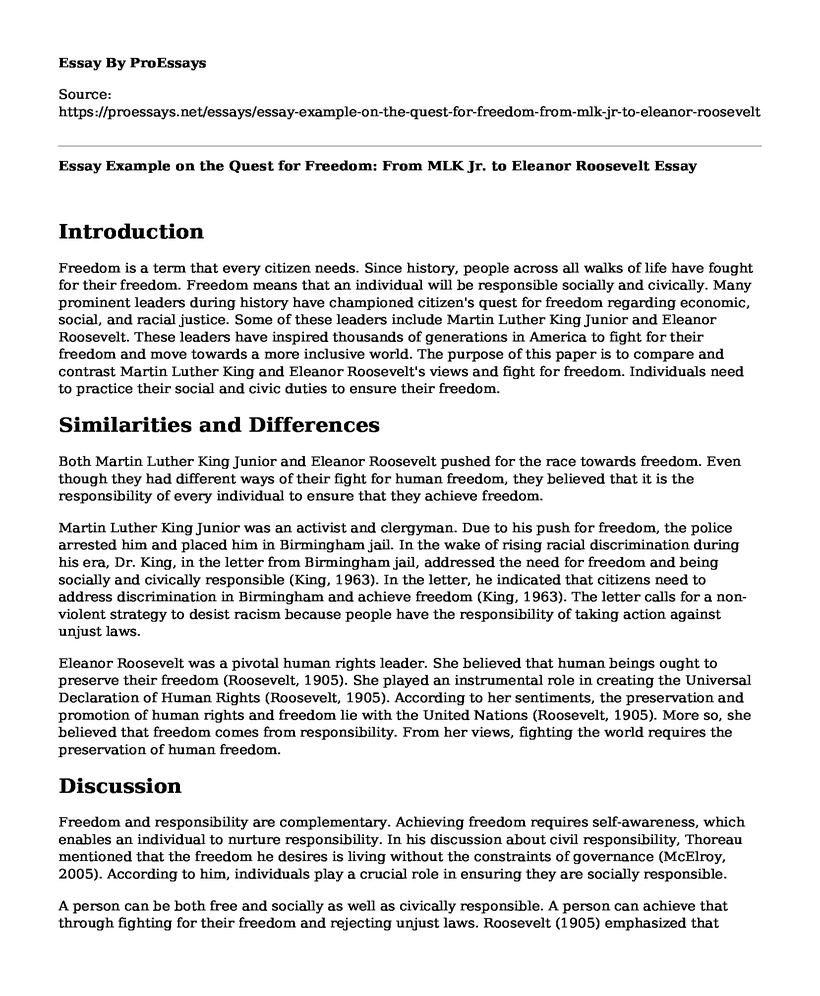Introduction
Freedom is a term that every citizen needs. Since history, people across all walks of life have fought for their freedom. Freedom means that an individual will be responsible socially and civically. Many prominent leaders during history have championed citizen's quest for freedom regarding economic, social, and racial justice. Some of these leaders include Martin Luther King Junior and Eleanor Roosevelt. These leaders have inspired thousands of generations in America to fight for their freedom and move towards a more inclusive world. The purpose of this paper is to compare and contrast Martin Luther King and Eleanor Roosevelt's views and fight for freedom. Individuals need to practice their social and civic duties to ensure their freedom.
Similarities and Differences
Both Martin Luther King Junior and Eleanor Roosevelt pushed for the race towards freedom. Even though they had different ways of their fight for human freedom, they believed that it is the responsibility of every individual to ensure that they achieve freedom.
Martin Luther King Junior was an activist and clergyman. Due to his push for freedom, the police arrested him and placed him in Birmingham jail. In the wake of rising racial discrimination during his era, Dr. King, in the letter from Birmingham jail, addressed the need for freedom and being socially and civically responsible (King, 1963). In the letter, he indicated that citizens need to address discrimination in Birmingham and achieve freedom (King, 1963). The letter calls for a non-violent strategy to desist racism because people have the responsibility of taking action against unjust laws.
Eleanor Roosevelt was a pivotal human rights leader. She believed that human beings ought to preserve their freedom (Roosevelt, 1905). She played an instrumental role in creating the Universal Declaration of Human Rights (Roosevelt, 1905). According to her sentiments, the preservation and promotion of human rights and freedom lie with the United Nations (Roosevelt, 1905). More so, she believed that freedom comes from responsibility. From her views, fighting the world requires the preservation of human freedom.
Discussion
Freedom and responsibility are complementary. Achieving freedom requires self-awareness, which enables an individual to nurture responsibility. In his discussion about civil responsibility, Thoreau mentioned that the freedom he desires is living without the constraints of governance (McElroy, 2005). According to him, individuals play a crucial role in ensuring they are socially responsible.
A person can be both free and socially as well as civically responsible. A person can achieve that through fighting for their freedom and rejecting unjust laws. Roosevelt (1905) emphasized that individuals need to secure their freedom because it is their right. Securing that freedom is what means to be socially and civically responsible. Freedoms such as speech, press, information, and assembly are ideals that make a person become responsible and achieve their desires in the long run.
Conclusion
Freedom and responsibility are models that coexist in society. The readings provide various insights into the discussion of freedom. For example, it is clear that individuals need to achieve a high degree of responsibility to achieve freedom. Through the life and experiences of Martin Luther King Junior, Eleanor Roosevelt, and Henry David Thoreau, it becomes easy to comprehend the extent of freedom and individual responsibility. As learned, for people to achieve freedom, they have to be socially and civically responsible to fight for their rights.
References
King, M. L. (1963). Letter from Birmingham Jail.
http://web.cn.edu/kwheeler/documents/Letter_Birmingham_Jail.pdf#page=3
McElroy, W. (2005). Henry David Thoreau and "Civil Disobedience. Part 1. The Future of
Freedom Foundation. https://www.fff.org/explore-freedom/article/henry-david-thoreau-civil-disobedience-part-1/
Roosevelt, E. (1905). The Struggle for Human Rights. America Rhetoric.
https://www.americanrhetoric.com/speeches/eleanorroosevelt.htm
Cite this page
Essay Example on the Quest for Freedom: From MLK Jr. to Eleanor Roosevelt. (2023, May 23). Retrieved from https://proessays.net/essays/essay-example-on-the-quest-for-freedom-from-mlk-jr-to-eleanor-roosevelt
If you are the original author of this essay and no longer wish to have it published on the ProEssays website, please click below to request its removal:
- How Do the Agencies of the Criminal Justice System Work Together to Provide Justice?
- The Most Recent Trends in Sentencing - Paper Example
- Essay Sample on International Law and Human Rights
- Research Paper on Juvenile Criminal Justice System: Rehabilitation Through Different Processes
- Essay Example on Due Process: Ensuring Equality & Fair Treatment Under the Law
- Essay Example on Maggie L. Walker: Pioneering Entrepreneur & Civil Rights Activist
- Essay Example on Crime: An Overview of Recent Cases Worldwide







